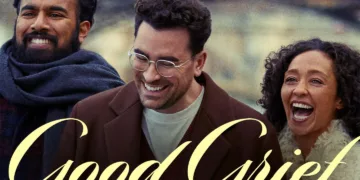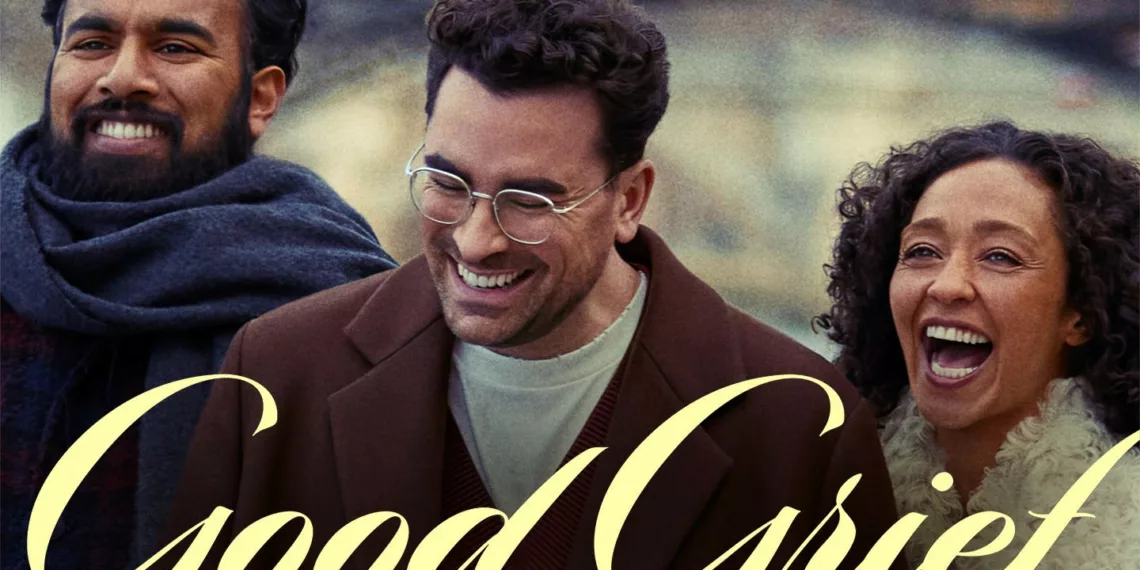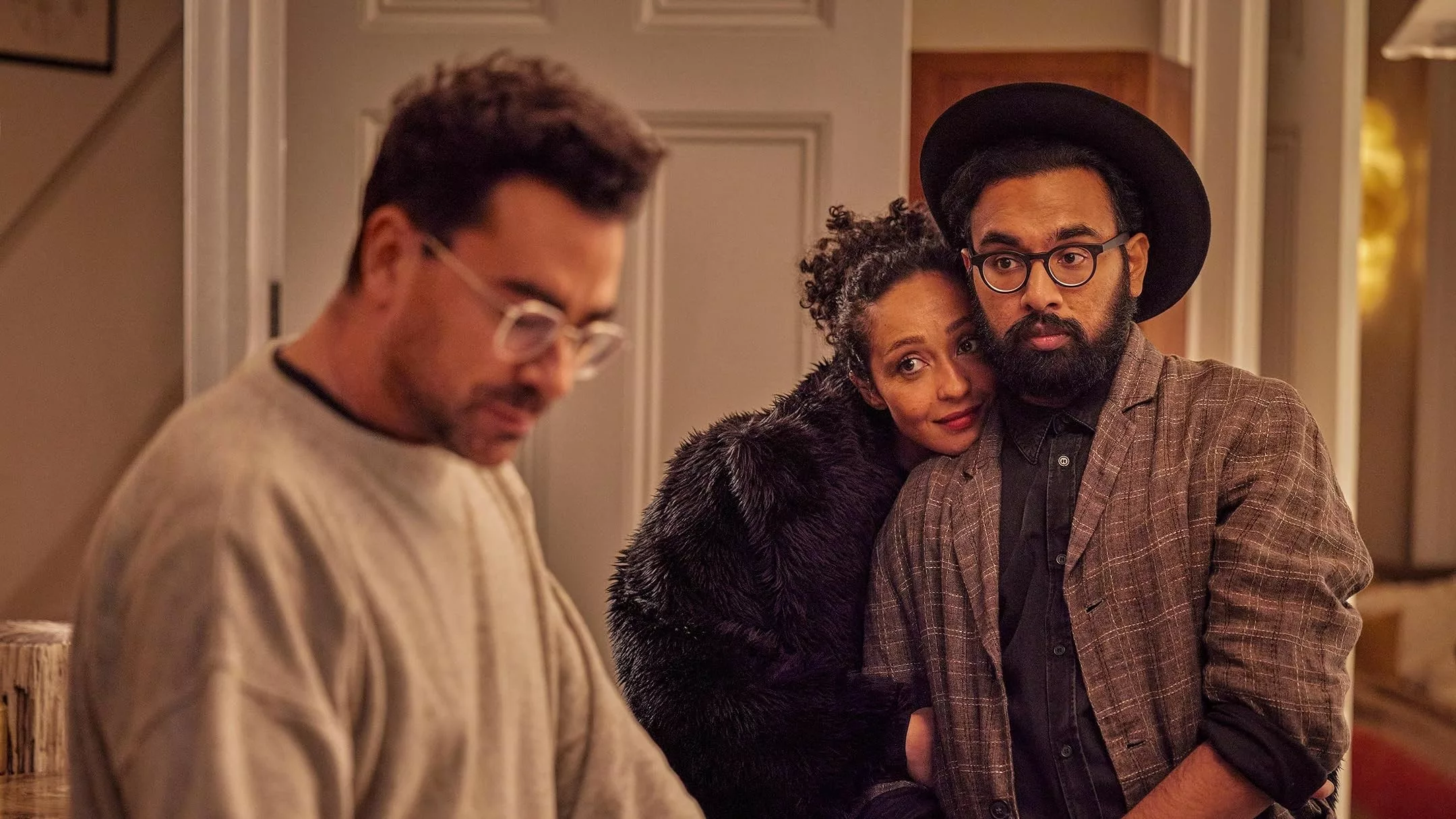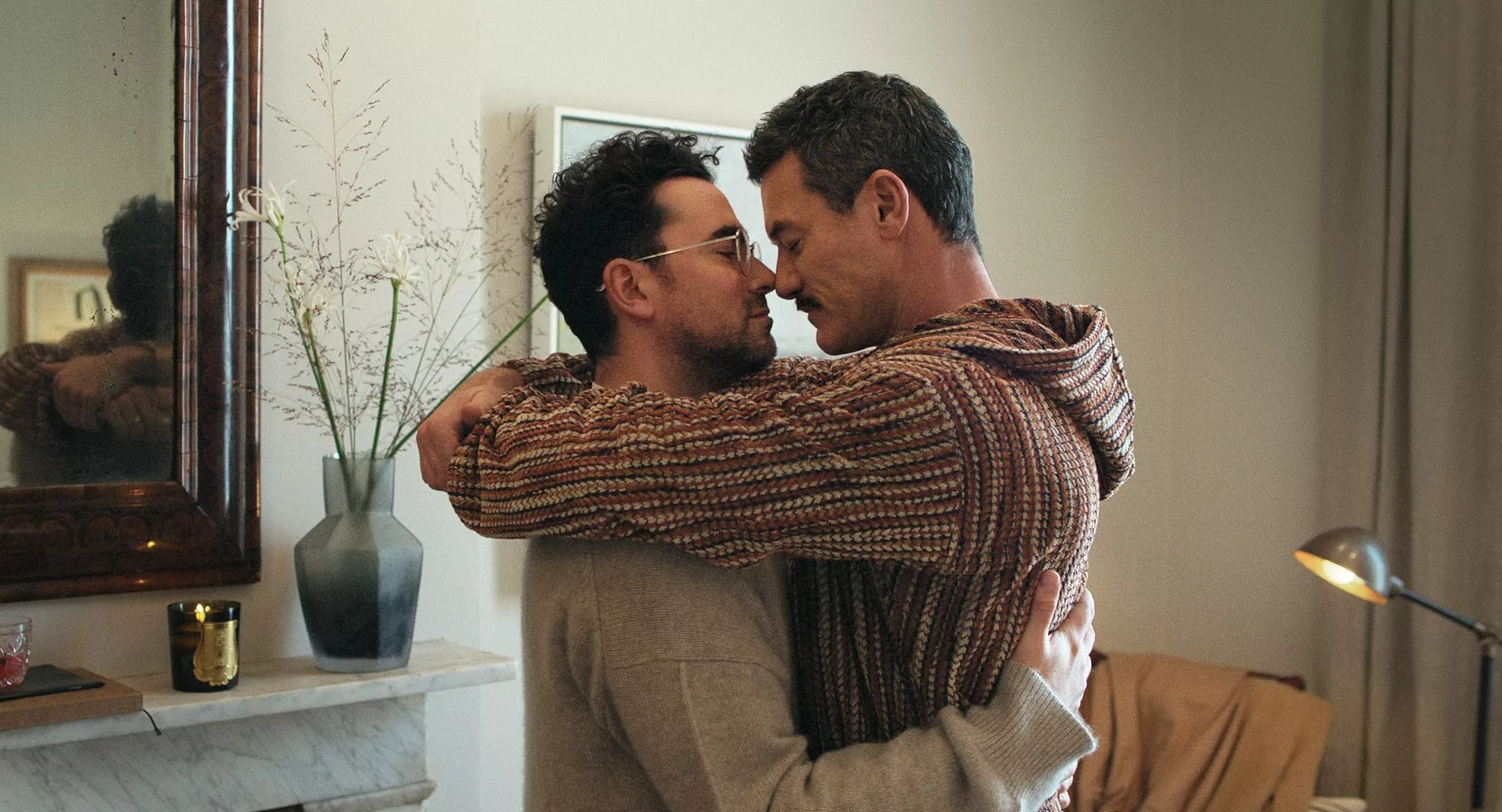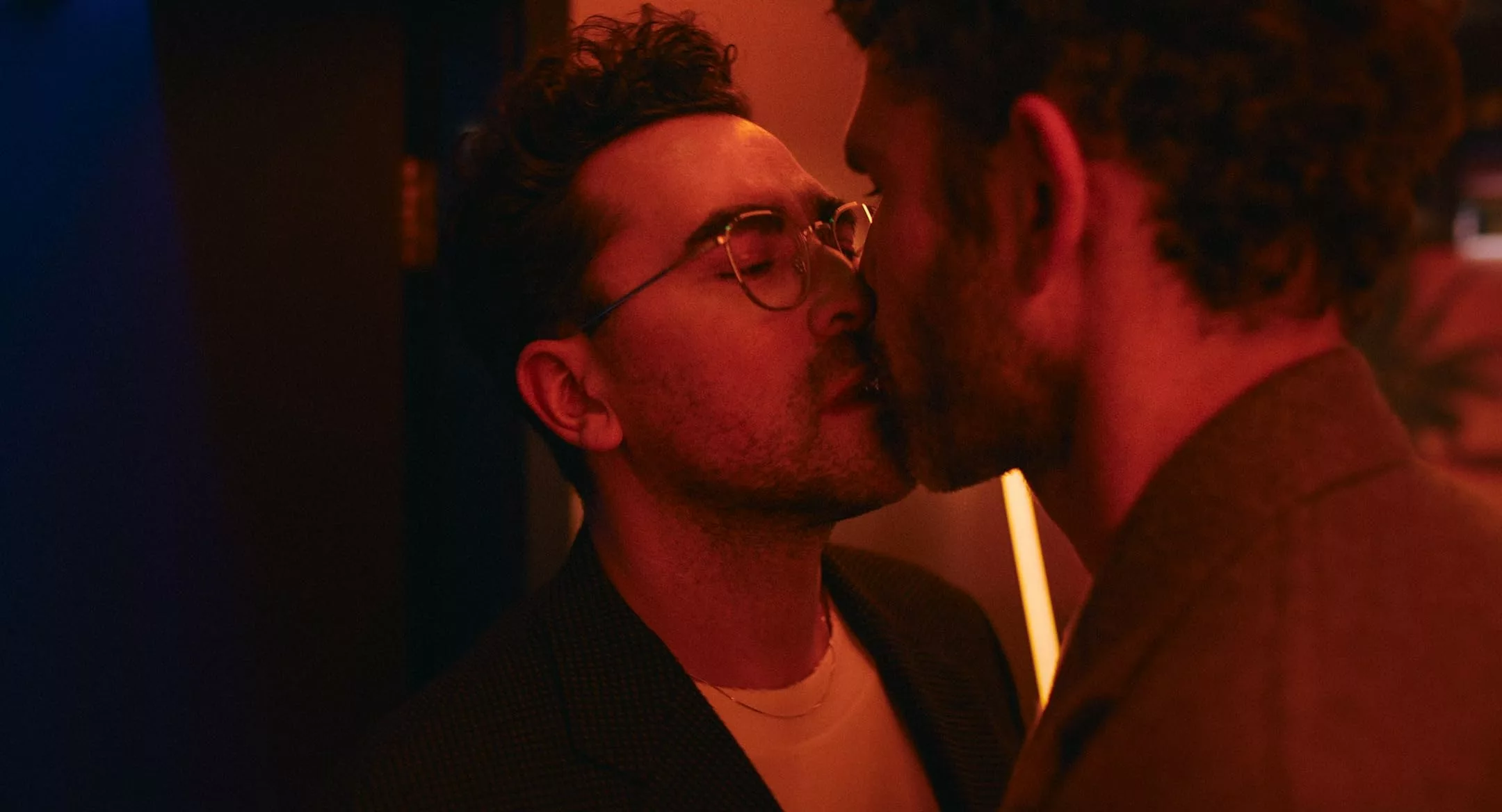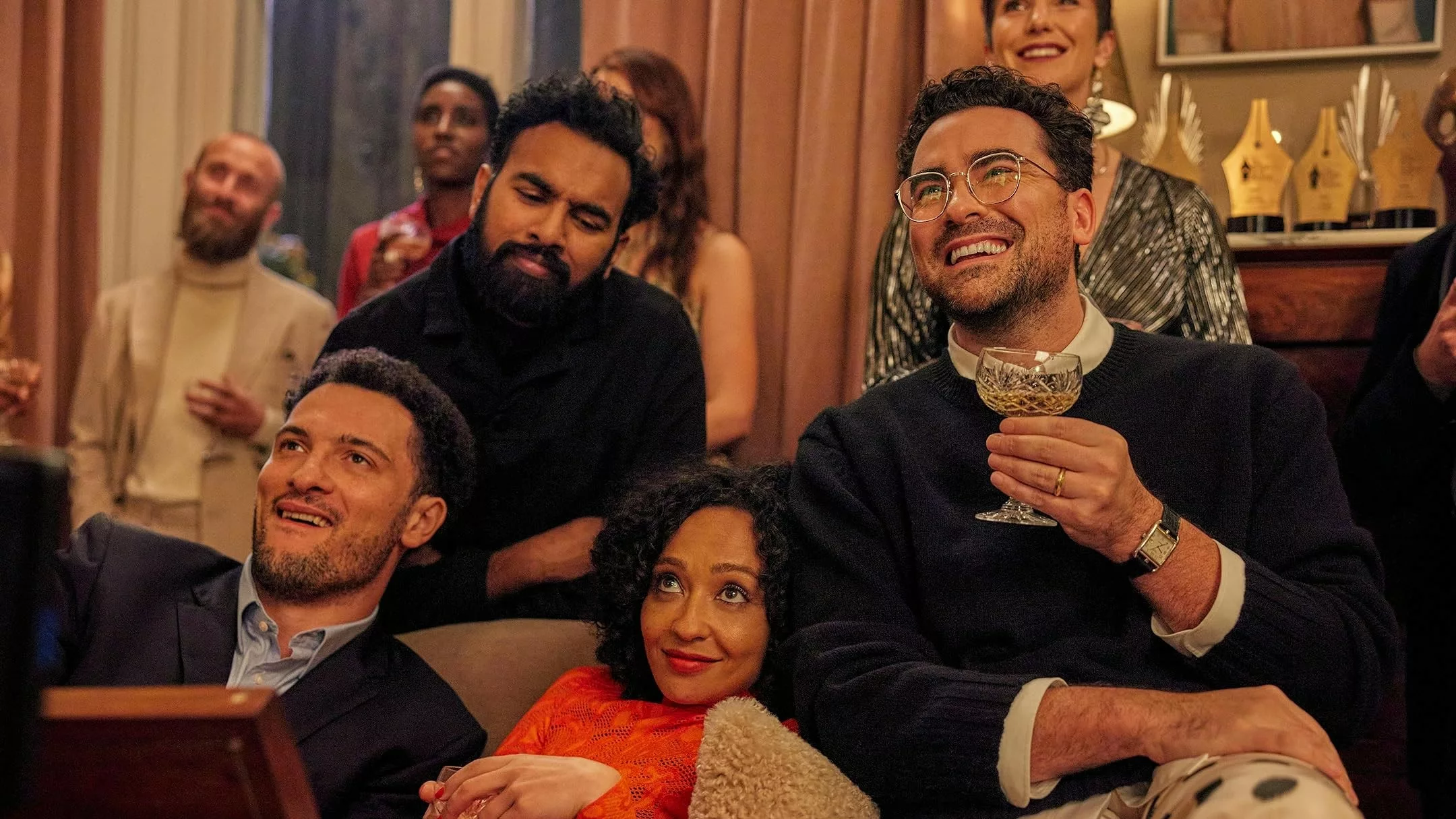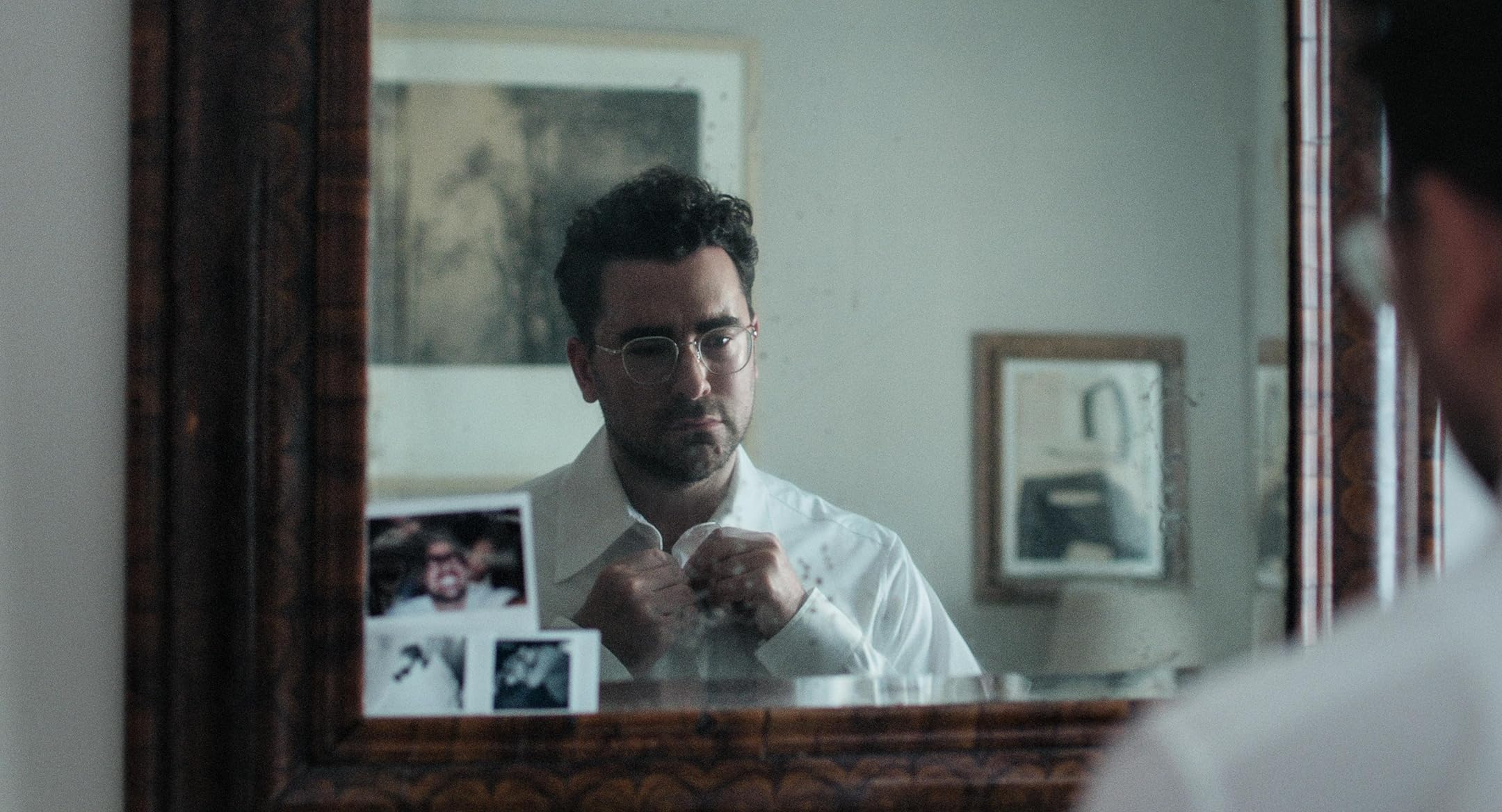Good Grief marks an impressive directorial debut for Daniel Levy, the Emmy-winning co-creator and star of the hit sitcom Schitt’s Creek. After six hilarious and heartwarming seasons playing pansexual fashion plate David Rose, Levy steps behind the camera to helm an intimate dramedy rooted in emotional authenticity. He also pens the script and stars as Marc, a London artist reeling from the sudden loss of his famous novelist husband Oliver (Luke Evans) in a tragic car accident.
When Marc finally works up the courage to open the Christmas card Oliver handed him on that fateful night a year prior, he discovers secrets that force him to re-examine their seemingly idyllic marriage. Still deep in grief, Marc impulsively decides to visit Oliver’s mystery Paris pied-à-terre, bringing along his two best friends Sophie (Ruth Negga) and Thomas (Himesh Patel) for moral support. But the City of Light unearths more darkness than closure. Over the course of their brief sojourn, all three friends must confront painful truths about love, betrayal, and their own stagnant lives.
Charting the jagged contours of grief with insight and compassion, Levy proves his range extends far beyond comedy. While flashes of wit poke through the melancholy, Good Grief is first and foremost a sensitive drama about the importance of living honestly in the shadow of life’s impermanence.
A Story of Love, Loss, and Letting Go
Good Grief opens on a bittersweet note, as married couple Marc and Oliver host their annual Christmas bash, surrounded by good cheer and friends. But the party turns tragic when Oliver, a wildly successful novelist, rushes off to a book signing and dies in a terrible car accident. Flash forward one year, and Marc remains deep in mourning, clinging to memories of Oliver and unable to move forward. At their goading, Marc finally reads the Christmas card Oliver handed him that fateful night—and makes a shocking discovery. Oliver confesses he was having an affair and suggests they reconsider their marriage when he returns from Paris.
Reeling from this betrayal, Marc learns Oliver secretly owned a lavish Paris apartment where he suspects his late husband conducted these trysts. Impulsively, he decides to visit the mystery pied-à-terre, inviting his two closest friends Sophie and Thomas to keep him company. Though unaware of Oliver’s affair, the two readily agree, hoping the change of scenery might lift Marc’s spirits.
Upon arriving in Paris, Marc begins piecing together clues about this hidden side of Oliver’s life, including striking up a flirtation with a handsome art gallerist named Theo. Meanwhile, when Thomas catches Sophie kissing a stranger, tensions boil over during a heated argument atop a Ferris wheel. With their own romantic lives in shambles, Thomas and Sophie realize they need to stop living vicariously through Marc’s drama and take responsibility for their own happiness.
By the film’s close, Marc makes peace with his grief over Oliver, forgives the betrayal, and resumes work on a painting he set aside years ago. Ready to embrace life’s impermanence and follow his passion, Marc heads down a hopeful new path, fortified by the friendship of Sophie and Thomas.
“Experience the Intense Drama of ‘The Woman in the Wall'”: Dive into a story of buried grief and unresolved history. Check out our comprehensive review of ‘The Woman in the Wall’, a psychological thriller that delves deep into Ireland’s painful legacy.
Navigating the Contours of Grief
At its core, Good Grief is a meditation on loss and the complex process of bereavement. Levy brings nuance and emotional honesty to Marc’s journey through grief, refusing to tidy the jagged emotions into facile platitudes about moving on. Instead, he peels back the layers slowly, tracing the messy spiral of anger, denial, regret, and eventual acceptance in the wake of Oliver’s shattering death. But the film also explores the way tragedy reshapes relationships with the living.
The secrets revealed about Oliver’s affair test Marc’s friendships with Sophie and Thomas. While grief initially draws them closer together, tensions simmer beneath the surface, culminating in a heated argument atop a Ferris wheel against the glittering Paris skyline. Their own dissatisfaction with love and career bubbles over, suggesting Oliver’s lavish lifestyle obscured their stagnancy. Through confrontation comes clarity about the need to take responsibility for their happiness.
Dramatic moments like this are balanced by flashes of Levy’s signature wry humor, much as grief oscillates unpredictably between anguish and numb routine. Quirky supporting characters like the actress who stars in the silly Victoria Valentine films—decked in cosplay at Oliver’s funeral—inject moments of stark tonal contrast that mirror real life.
But Good Grief remains rooted in emotion and introspection rather than manufactured hijinks, rewarding patient viewers with hard-won catharsis. While the script occasionally grasps for easy metaphors like Marc’s long-neglected painting, Levy largely allows his characters’ halting revelations to emerge organically, steeping the film in poignant authenticity.
Ava DuVernay’s “Origin” Explored: “Immerse yourself in the layers of narrative and emotion in Ava DuVernay’s latest masterpiece through our Detailed Review of ‘Origin’. Discover a film that connects personal grief with global insights.”
A Star-Studded Ensemble Under Levy’s Steady Hand
In his first stint behind the camera, Levy proves his directing chops rival his acting, juggling tonal shifts from earnest drama to dark comedy with ease. He carves out space for his talented ensemble to inhabit messy emotions, trusting subtle expressions over showy speeches. As Marc, Levy shoulders the film’s emotional weight with affecting restraint, peeling off the character’s wry wit to reveal wells of suppressed anguish. We watch Marc retreat behind the comfort of labels like “widower” and “orphan” before confronting his true self beneath the grief as he rediscovers purpose.
But marquee-worthy turns from Ruth Negga and Himesh Patel nearly steal the spotlight as Marc’s best friends Sophie and Thomas. Negga brings infectious warmth and vivacious humor to the “hot mess” Sophie, a serial romantic drifting through life with a wine glass permanently glued to her hand. Patel nails Thomas’ barely concealed jealousy towards Oliver, even as deep affection for Marc underlies his biting remarks. Their fractured love lives come to a head in an argument that lays bare the way Marc’s grief enabled their complacency.
Among the supporting cast, Arnaud Valois makes the strongest impression as Theo, a charming art curator who woos Marc with a private, forbidden glimpse at one of Paris’ most iconic artworks. Their flirtation injects Marc’s journey with a much-needed dose of romance and cathartic connection. On the other hand, Emma Corrin feels underutilized in an odd cameo as a performance artist writhing about in a tangled mass of yarn. It epitomizes the script’s tendency to grasp unsubtly at metaphors, unlike the elegant brushstrokes of emotion the cast brings to life under Levy’s steady guidance.
With razor-sharp comedic instincts balanced by empathetic insight into the human condition, Levy seems poised to tackle even more ambitious fare behind the camera. And judging by the top-tier talents flocking to star in his inaugural film effort, Hollywood agrees this jack-of-all-trades still has masterpieces left to create.
“Embark on a scenic journey through the heart of Tuscany with our Made in Italy review. Discover how a father and son find healing amidst the breathtaking landscapes. A tale of family, grief, and the beauty of second chances awaits.”
A Visual Feast Steeped in Melancholy
Beyond coaxing sensitive performances, Levy’s keen visual eye further elevates Good Grief from run-of-the-mill relationship dramas. He teams with talented behind-the-scenes collaborators to create alluring backdrops that mirror the characters’ shifting emotional states. Cinematographer Øystein Mamen bathes both London and Paris in melancholy blue hues as winter’s early nightfall echoes Marc’s grief, interspersed with warm golden interiors hinting at rekindled hope. Production designer Alice Normington crafts lived-in, Character-filled spaces bursting with memories both joyful and sorrowful, from Marc and Oliver’s cozy book-lined apartment to Theo’s chic minimalist gallery.
And the sparkling City of Light has never looked more enchanting, thanks to sweeping aerial views of bustling boulevards and quaint cafes. Levy steeps Paris in romance despite Marc’s broken heart, letting iconic landmarks like the Eiffel Tower and Ferris wheel remind us that life persists amidst personal tragedy. Clever musical cues like Bonnie Raitt’s “I Can’t Make You Love Me” needle the emotions without pushing too hard. Meanwhile, frequent shots gazing through rain-specked windows evoke the muted isolation of struggling through grief’s darkest days.
Some moments border on cloying symbolism, like Emma Corrin ensnared in yards of unraveled yarn. But on the whole, Levy translates psychological nuance into sublime imagery, and Normington’s production design perfectly captures Oliver’s double life once Marc uncovers his stylish secret Parisian hideaway. Visually resplendent while remaining rooted in emotional truth, Good Grief announces Levy’s artistic voice as director rivals his acting talent.
Witness the intimate and emotional journey of Una in our When the Light Breaks review. Set in Iceland, this film explores grief, loss, and unexpected connections in the aftermath of a tragic tunnel fire. Discover how Elín Hall’s nuanced performance and Rúnar Rúnarsson’s sensitive direction create a deeply moving cinematic experience.
Probing Grief’s Jagged Contours with Emotional Honesty
Rooted in Levy’s personal grief journey after losing his mother, Good Grief brings poignant insight and emotional depth to the seldom-explored aftermath of spousal loss beyond convenient closure. He peels back the layers slowly, following Marc through fitful spirals of denial, anger, numb acceptance, and eventual renewal over the course of a year. But Levy rightly refuses easy answers, lingering in the liminal uncertainty that defines grieving, where humor sporadically pierces heartache much like life oscillating forward despite tragedy’s gravity pulling backward.
Rather than relying on melodrama or trauma, the film probes grief’s intricacies through hushed revelation and subtle metamorphosis in its trio of leads. We watch Marc retreat behind his witty armor and convenient labels as misdirection from more complex self-actualization now required in Oliver’s absence. Their seemingly solid marriage obscured Marc’s creative stagnation and dependence on Oliver for identity, purpose, stability. Only through confronting suppressed doubts about the relationship sparked by Oliver’s betrayal can Marc forgive, make peace with impermanence, and rededicate himself to artistic passion.
Similarly, Sophie and Thomas awaken to their own complacency masked by Marc’s latest drama, leading to overdue confrontation atop the Ferris wheel. Levy avoids letting either devolve into caricature sidekick roles, giving Negga and Patel room to inject charismatic humor. Meanwhile, Theo represents compassionate forward vision as Marc learns healthy love need not eclipse selfhood. Resisting the allure of new romance lets Marc stand independently.
Admittedly the story structure loses some momentum mid-film after the initial shock value of secrets revealed back in London. The Paris trip feels conveniently engineered for change of scenery rather than emerging organically from character motivation and growth. But minor quibbles aside, Levy and his exceptional cast sell the tonal shifts and sentiment with affecting authenticity. Scenes like Oliver’s friends celebrating his life by belting out a rousing holiday singalong minutes before grief ambushes the party epitomize Levy’s stealthy emotional power. Life-affirming highs richer for the bittersweet lows.
Discover the heartfelt and humorous journey of comedians in our Good One review. Follow their struggles, successes, and the comedic craft behind the scenes. Learn how this series offers a unique glimpse into the lives of those who make us laugh, blending comedy with real-life challenges.
Promising Debut Exploring Grief’s Nuance
With razor-sharp comedic wit equally matched by empathetic insight into the tangled thickets of grief, Levy impresses in his multi-hyphenate debut behind the camera. He mines the jagged contours of personal tragedy with emotional authenticity rather than facile platitudes. YES, the script relies a bit too heavily on conveying metaphor through Marc’s neglected painting or Emma Corrin’s obtuse performance art. Certain plot points like the impulsive Paris trip feel contrived.
However, the powerful work from gifted ensemble players exposes deeper strands of meaning and catharsis. Never pandering to sentimentality, Levy still leaves us profoundly moved. He generously cedes the spotlight to let Ruth Negga and Himesh Patel mine nuance as Marc’s best friends, transforming stereotypical roles into lived-in characters whose climactic confrontation conveys hard-won wisdom. Meanwhile, Levy himself charts a compelling emotional arc for Marc saturated in quiet heartbreak yet uplifted by renewal—proving his talents translate powerfully from comedy to drama.
While more layered character development and tighter plotting would elevate a strong debut to greatness, Levy establishes himself as an astute observer of love’s unpredictable rhythms. Good Grief will satisfy viewers who appreciate graceful cinematic storytelling steeped in hard-won emotional payoff over neatly packaged happy endings. With indie arthouse sensibilities anchored by familiar star power, Levy has crafted an accessible gateway into the kind of mature, evocative adult dramas all too rare among major studio releases these days. Where he goes next holds thrilling promise.
The Review
Good Grief
Daniel Levy impresses with his multi-hyphenate directorial debut, bringing hard-won emotional wisdom to grief's jagged journey. Anchored by tender performances and glimmering style, Good Grief heralds a promising new independent voice.
PROS
- Strong directing debut for Daniel Levy
- Powerful lead and supporting performances
- Emotional depth and insight into grief's complexities
- Gorgeous cinematography capturing alluring Paris/London locations
- Moments of levity balancing heavier dramatic tones
CONS
- Uneven pacing and plot loses steam midway
- Underdeveloped secondary characters
- Some unsubtle metaphors and symbolic moments
- Emma Corrin's odd cameo lacks purpose
